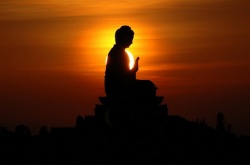Difference between revisions of "Dhātu-vavatthāna"
(Created page with "thumb|250px| Budd buddah.jpg dhātu-vavatthāna: 'analysis (or determining) of the 4 elements', is described in Vis.M. XI, 2, as the last of t...") |
|||
| (One intermediate revision by the same user not shown) | |||
| Line 1: | Line 1: | ||
[[File:Buddh-Sun2.jpg|thumb|250px|]] | [[File:Buddh-Sun2.jpg|thumb|250px|]] | ||
| − | + | [[dhātu-vavatthāna]]: 'analysis (or determining) of the 4 [[elements]]', is described in Vis.M. XI, 2, as the last of the 40 [[mental]] exercises (s. [[bhāvanā]]). In a condensed [[form]] this exercise is handed down in D. 22 and M. 10 (s. [[Satipaṭṭhāna]]), but in detail explained in M. 28, 62, 140. The simile of the butcher in M. 10 ("Just, o [[monks]], as a [[skilled]] butcher or butcher's apprentice, after having slaughtered a cow and divided it into separate portions, should sit down at the junction of four highroads; just so does the [[disciple]] [[contemplate]] this [[body]] with regard to the [[elements]]") is thus explained in Vis.M. XI.: "To the butcher, who rears the cow, brings it to the slaughter-house, ties it, puts it there, slaughters it, or looks at the slaughtered and [[dead]] cow, the [[idea]] 'cow' does not disappear as long as he has not yet cut the [[body]] open and taken it to pieces. As soon, however, as he sits down, after having cut it open and taken it to pieces, the [[idea]] 'cow' disappears to him, and the [[idea]] 'meat' arises. And he does not think: 'A cow do I sell, or 'A cow do they buy.' Just so, when the [[monk]] formerly was still an [[ignorant]] worldling, [[layman]] or a homeless one, the [[ideas]] '[[living being]]' or 'man' or '{{Wiki|individual}}' had not yet disappeared as long as he had not taken this [[body]], whatever position or [[direction]] it had, to pieces and analysed it piece by piece. As soon, however, as he analysed this [[body]] into its [[elements]], the [[idea]] 'living {{Wiki|being}}' disappeared to him, and his [[mind]] became established in the {{Wiki|contemplation}} of the [[elements]]." - (App.). | |
| − | [[dhātu-vavatthāna]]: 'analysis (or determining) of the 4 elements', is described in Vis.M. XI, 2, as the last of the 40 mental exercises (s. [[bhāvanā]]). In a condensed form this exercise is handed down in D. 22 and M. 10 (s. [[Satipaṭṭhāna]]), but in detail explained in M. 28, 62, 140. The simile of the butcher in M. 10 ("Just, o [[monks]], as a skilled butcher or butcher's apprentice, after having slaughtered a cow and divided it into separate portions, should sit down at the junction of four highroads; just so does the [[disciple]] contemplate this body with regard to the elements") is thus explained in Vis.M. XI.: "To the butcher, who rears the cow, brings it to the slaughter-house, ties it, puts it there, slaughters it, or looks at the slaughtered and dead cow, the idea 'cow' does not disappear as long as he has not yet cut the body open and taken it to pieces. As soon, however, as he sits down, after having cut it open and taken it to pieces, the idea 'cow' disappears to him, and the idea 'meat' arises. And he does not think: 'A cow do I sell, or 'A cow do they buy.' Just so, when the [[monk]] formerly was still an ignorant worldling, layman or a homeless one, the ideas 'living being' or 'man' or 'individual' had not yet disappeared as long as he had not taken this [[body]], whatever position or direction it had, to pieces and analysed it piece by piece. As soon, however, as he analysed this [[body]] into its elements, the idea 'living {{Wiki|being}}' disappeared to him, and his mind became established in the {{Wiki|contemplation}} of the elements." - (App.). | ||
{{R}} | {{R}} | ||
[http://dictionary.buddhistdoor.com/en/word/2733/dhatu-vavatthana dictionary.buddhistdoor.com] | [http://dictionary.buddhistdoor.com/en/word/2733/dhatu-vavatthana dictionary.buddhistdoor.com] | ||
[[Category:Dhatu]] | [[Category:Dhatu]] | ||
{{PaliTerminology}} | {{PaliTerminology}} | ||
Latest revision as of 11:45, 9 September 2013
dhātu-vavatthāna: 'analysis (or determining) of the 4 elements', is described in Vis.M. XI, 2, as the last of the 40 mental exercises (s. bhāvanā). In a condensed form this exercise is handed down in D. 22 and M. 10 (s. Satipaṭṭhāna), but in detail explained in M. 28, 62, 140. The simile of the butcher in M. 10 ("Just, o monks, as a skilled butcher or butcher's apprentice, after having slaughtered a cow and divided it into separate portions, should sit down at the junction of four highroads; just so does the disciple contemplate this body with regard to the elements") is thus explained in Vis.M. XI.: "To the butcher, who rears the cow, brings it to the slaughter-house, ties it, puts it there, slaughters it, or looks at the slaughtered and dead cow, the idea 'cow' does not disappear as long as he has not yet cut the body open and taken it to pieces. As soon, however, as he sits down, after having cut it open and taken it to pieces, the idea 'cow' disappears to him, and the idea 'meat' arises. And he does not think: 'A cow do I sell, or 'A cow do they buy.' Just so, when the monk formerly was still an ignorant worldling, layman or a homeless one, the ideas 'living being' or 'man' or 'individual' had not yet disappeared as long as he had not taken this body, whatever position or direction it had, to pieces and analysed it piece by piece. As soon, however, as he analysed this body into its elements, the idea 'living being' disappeared to him, and his mind became established in the contemplation of the elements." - (App.).
